Like Mörk Borg says on the back of the book: It's really not suitable for those under 16 years of age. I try to keep things fairly tame here, but the game involves a lot of horrific themes including gore and body horror, so if that doesn't sound like something you'd like, feel free to skip this one. If you read the article and like the concept but want something less intense, there are several similar games you could look into. I've heard good things about The Black Hack 2e, for example.
By your best guess, it has been days in the labyrinthian crypts. Time is easy to lose track of down here. Your food is rotting, but surely it hasn't been weeks already. Surely... Your lantern, also low on fuel, sputters as you turn a corner. Before you looms a skeleton smeared with viscera. It stands perfectly still, but you can tell its vacant eyes are watching you carefully. The voice of your lost companion crying out for help begins to echo from its open mouth.
You remember these cries. You saw that very same companion die days ago.
Just as you move to draw your sword, your lantern flickers for only a moment, but the creature is gone. It is completely silent now, lurking somewhere in the dark just out of sight. For now, you still have plenty of strength left; it may have been a fair fight. But you're getting hungrier, weaker. When that thing comes back, you're not sure if you'll be able to fight it off.
If only you could remember the way out.
Mörk Borg (Dark Fort in Swedish) is an extremely rules-lite tabletop roleplaying game (TTRPG) inspired by the "old school" TTRPGs ("OSR games" if want to learn more). These games are known to be punishing and rewarding of creativity while being fiddly rules-wise.
Mörk Borg tries to capture the good aspects of classic TTRPGs while streamlining the clunky ones. One of the big departures from the classics is doing away with grid maps and models, making it a great system for playing online over basically any voice call app if you don't have a local group.
It's usually played with one GM and 3-4 players, but things can be tweaked pretty easily for huge groups or very small ones. There's even a well-regarded community supplement for playing the game completely solo called Sölitary Defilement (more on the community supplements later).
Part of the tradition of old school TTRPGs is that game balance is a much looser concept. Balancing for different numbers of players is more about how you play out the scenarios rather than numerical tweaks. Enemies are rarely meant to be fought fairly — players are expected to do everything possible to tip the odds in their favor or even avoid combat entirely.
With this in mind, Mörk Borg's intense setting is not coincidental. You don't play as heroes; characters are morally dubious at best and terrifying at worst, but you can be sure anything you find in the darkness will be even worse. You play cruel people in a cruel world who will do anything to survive.
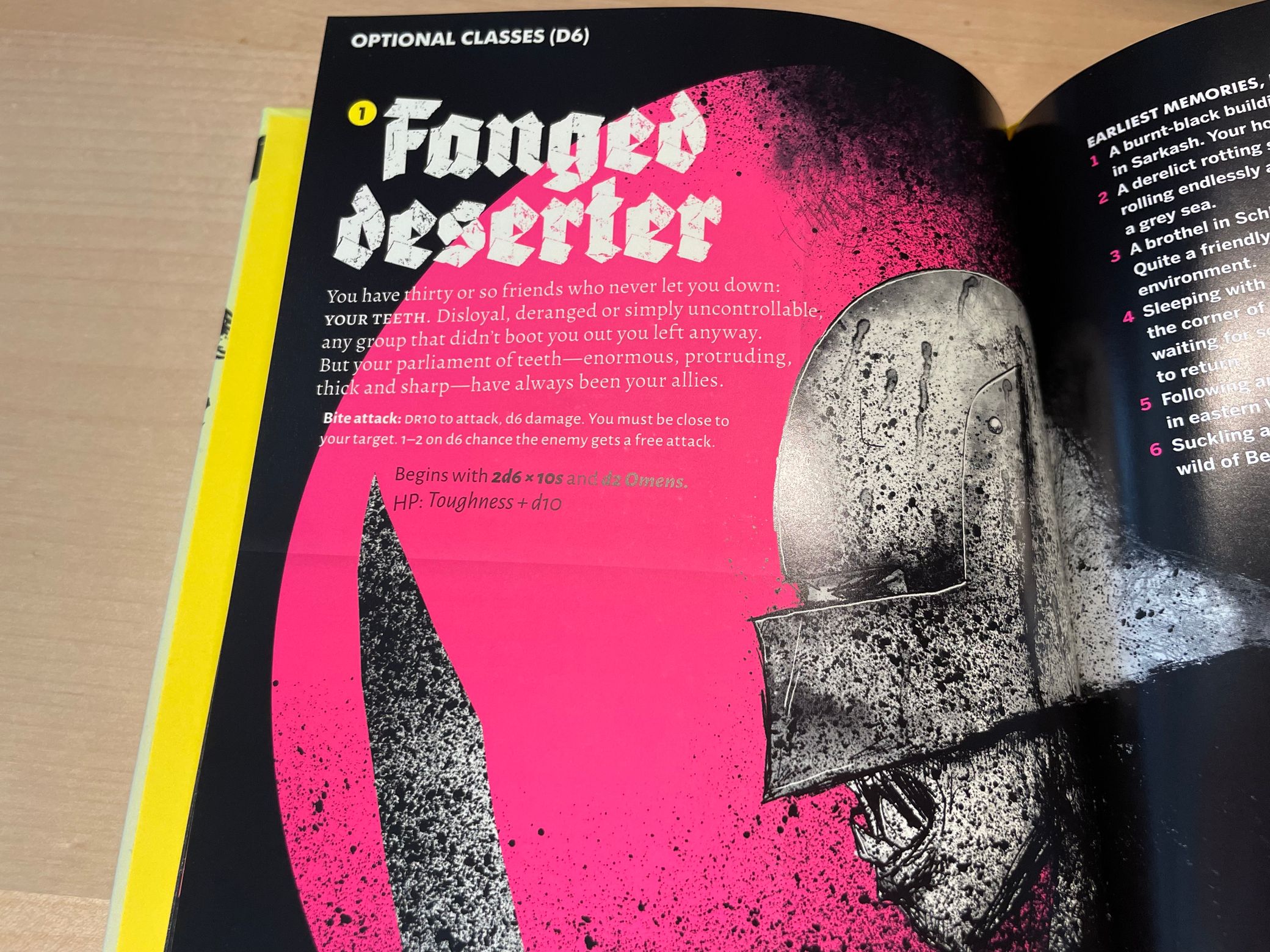
A while back, I wrote about Blades in the Dark, another game I love for totally different reasons. I consider Blades one of the best examples of "modern" tabletop gaming with a big emphasis on compelling characters and storytelling. If you're familiar with Blades or more generally with narrative-heavy D&D campaigns like Critical Role, Mörk Borg feels quite different.
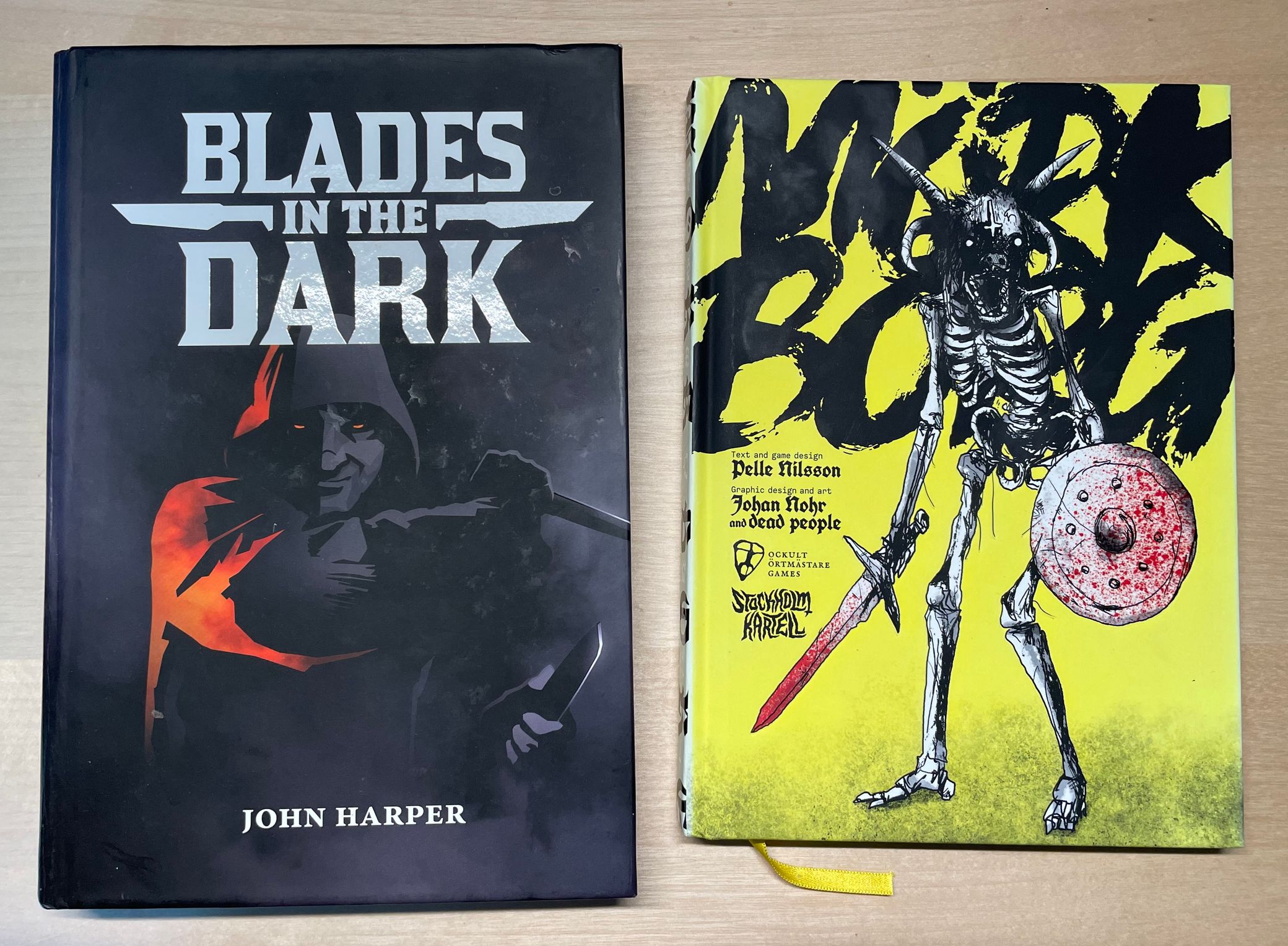
Mörk Borg is much more of a "game". You are not trying to embody a complex character authentically. In a session of Mörk Borg, you are a player piloting a weird little guy in exceptionally weird environments, trying to problem solve unfair encounters however you can. Players need to look for creative solutions and GMs need to reward creativity.
Characters will probably die at some point (maybe even within a few minutes), so you roll up another one. This can actually be a valuable learning experience to help get over a common issue with new players: being unwilling to really push the boundaries of what their character can try. In Mörk Borg, you're going to die if you take a straightforward approach, so get creative.
The darkness of the setting and possiblility of character death are crucial to understand and get on board with before playing in order to have a good time, though, and where I think Mörk Borg loses people who aren't prepared. The "character" is much more about the collective world than any one individual player character.
That said, characters in Mörk Borg aren't completely flavorless by any means. The game encourages an equal balance of mechanical and roleplaying aspects to each character. The roleplaying is just not as nuanced.
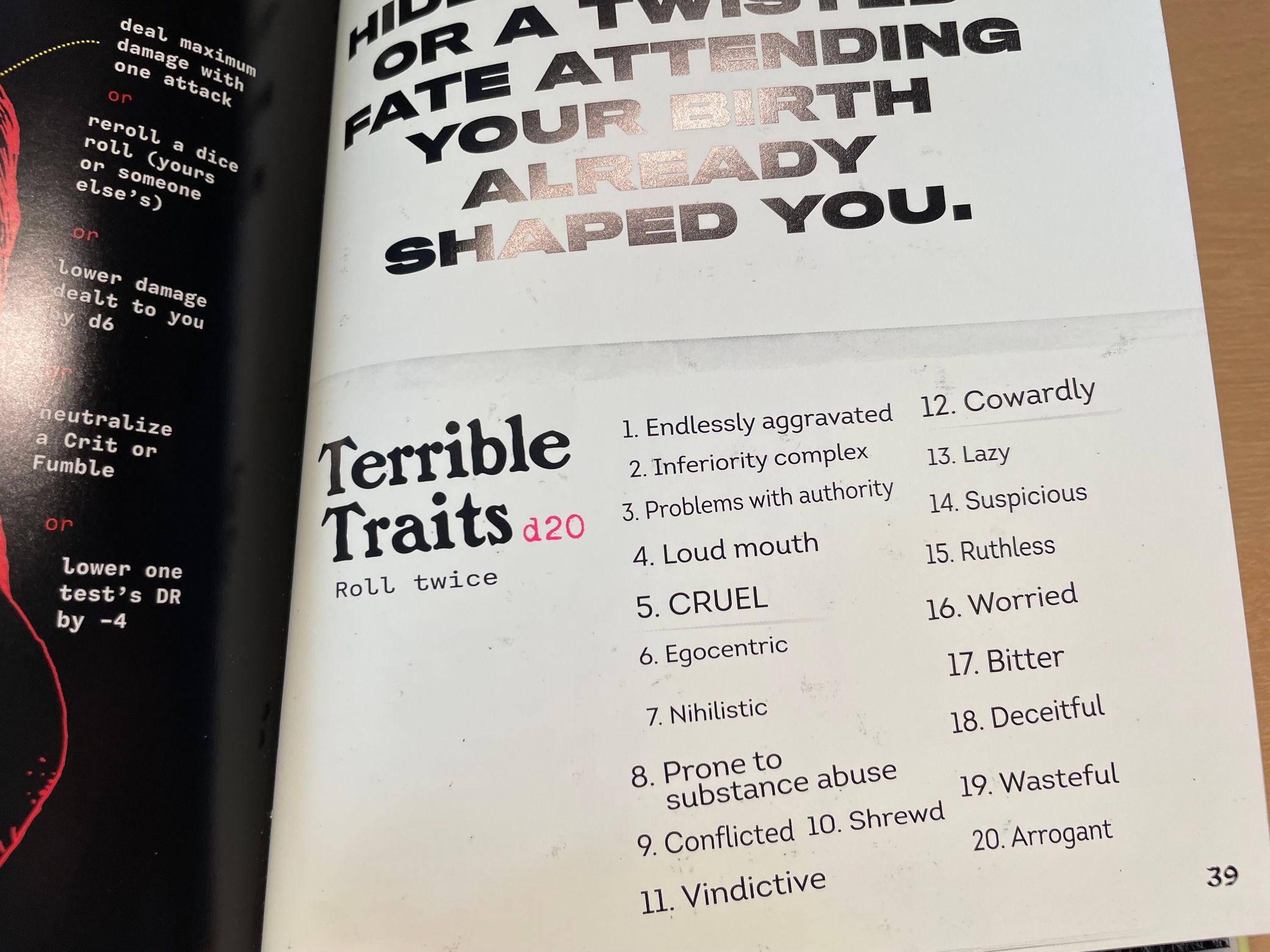
I find that freeing. I love a good narrative game, but sometimes it's refreshing to take control of an unambiguously flawed and maybe even evil character, then just take them to their natural conclusion. If I roll a character who is egotistical to a fault, maybe I decide to fight the lone, weak-looking goblin in my way instead of leaving it alone. Little does my character know that they're now cursed to become a goblin in a few days.
It's a dark but cathartic end to the flawed person I created. It reminds me of Edgar Allen Poe stories. The question is rarely whether a character is good or bad, but instead how bad are they and what their fate will be.
I love the way Mörk Bork models dungeons as well. There's a quick intro to set the mood, but that's all you get. Each dungeon has rooms with a small list of things (usually 6 or so, not all of them substantial) that players may find in the room. Not everyone will like it, but I find it to be the perfect middle-ground when running a game to give me enough to latch onto but plenty of space to get creative.
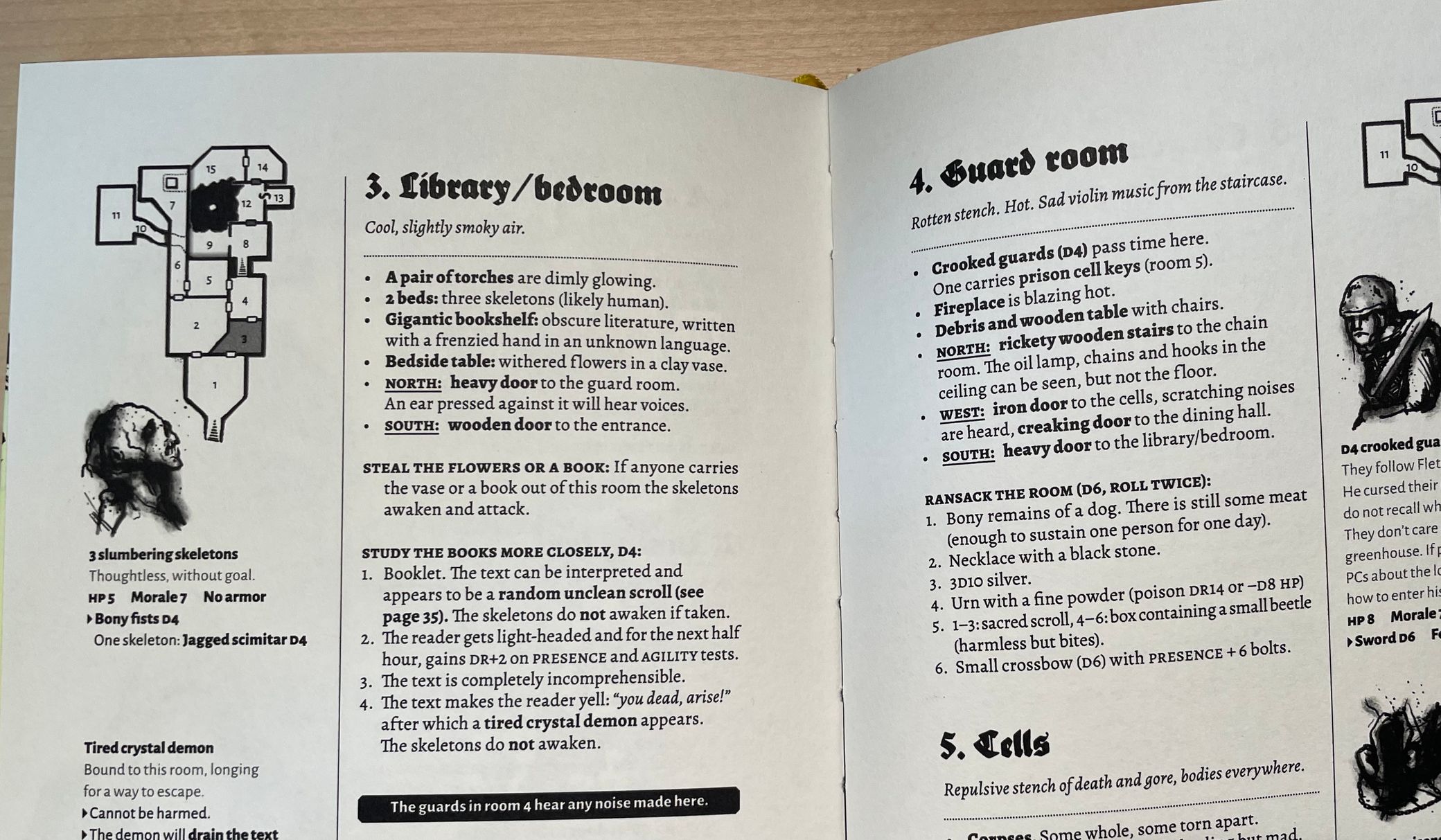
The surprise
When I first got Mörk Borg, I thought it was really cool visually, but admittedly I didn't really "get" it. What got me to take another look at it was the community.
The amount of expansions and community-made content for Mörk Borg is staggering. There are dungeons, monsters, player classes, items, spells, and more. Feretory and Heretic are two compilations of community-made expansions that are officially published into high-quality booklets and could almost be considered other parts of the core game. I'm also extremely impressed by third-party designer Christian Eichhorn's offerings on Itch.io. Really, there's tons of stuff out there to look through (Itch.io and DriveThruRPG are the main places to look) if you want to dive deep, and that's just for Mörk Borg.
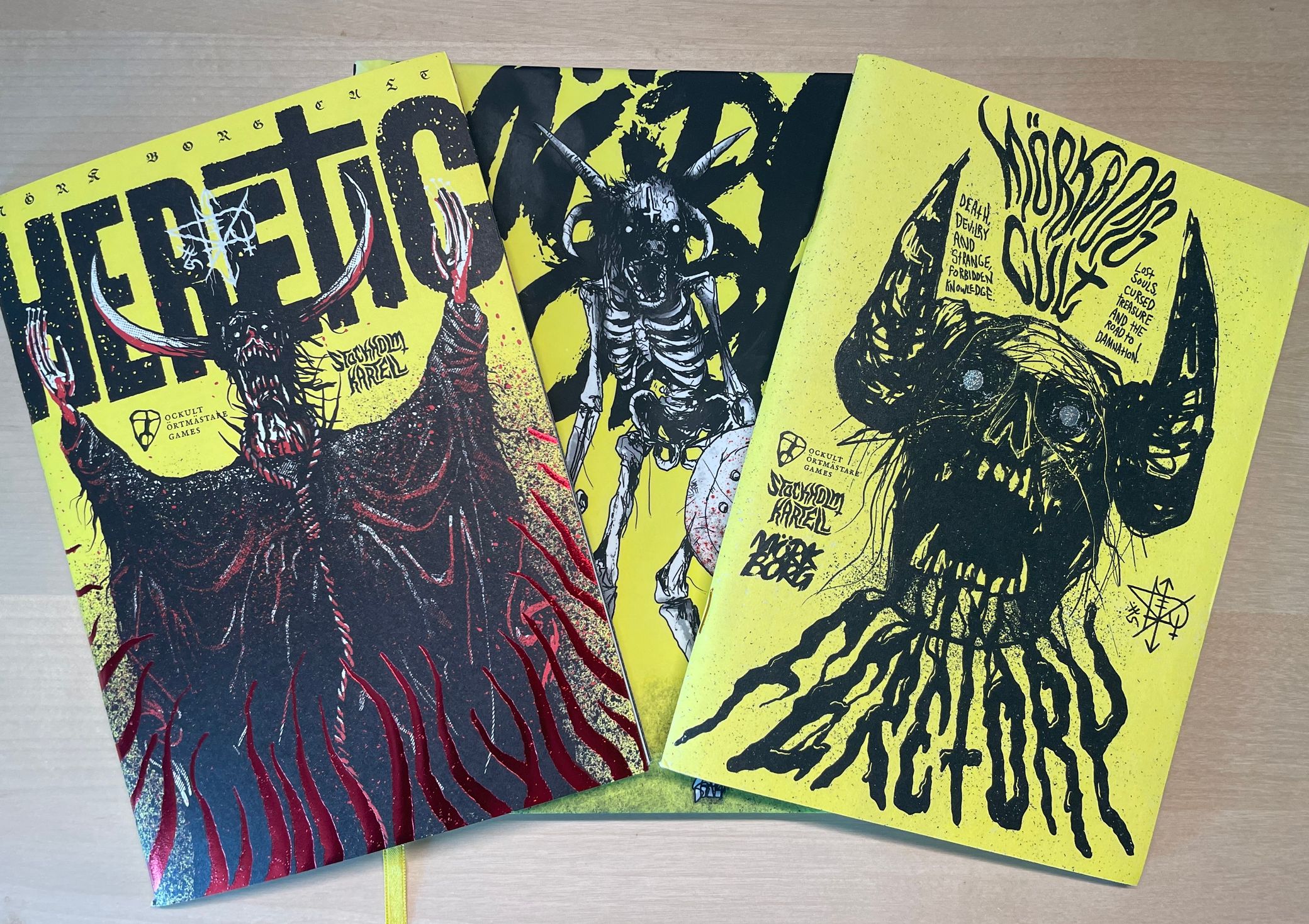
It's also gone off to inspire whole games, like Cy_Borg, Mörk Borg in a cyberpunk setting. There are even other types of games like Forbidden Psalm, a (primarily) cooperative skirmish wargame that's fully compatible with Mörk Borg. Forbidden Psalm was actually my route back into Mörk Borg. I thought, "If there is so much content from lots of creators for this game, I must have missed what made it special."
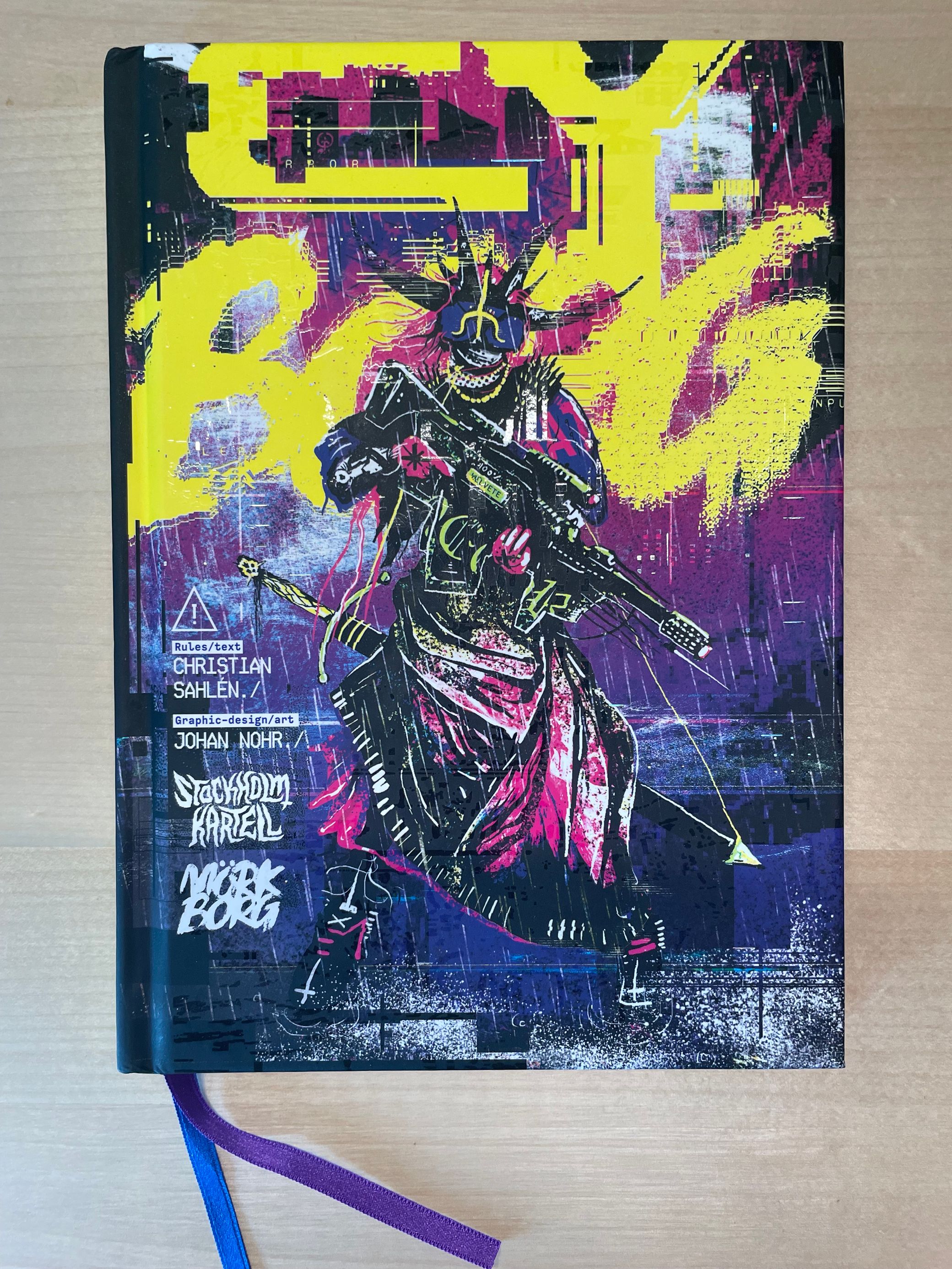
The other crucial community-made piece that made things click for me was a free guide called Principia Apocrypha: A New Expression of Old School RPG Playstyle Principles. Despite the comically long name, the guide itself is a quick read that spells out the right mindset to take into a game like Mörk Borg. I recommend it to really any TTRPG player, but especially if you want to try Mörk Borg.
If you've seen Mörk Borg before and thought it looked cool but there wasn't much going on beyond that, give the community-made resources a look. When you're in the mood for a challenge and don't mind playing in a brutal world, there's a lot to like.


